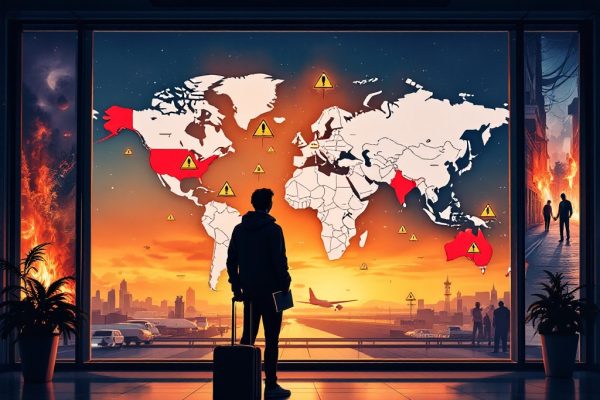What You Should Know About Travel Insurance
Worried about unexpected hiccups ruining your trip? Travel insurance protects you from financial setbacks caused by medical emergencies, trip cancellations, and lost luggage. From minor flight delays to serious illnesses abroad, the right policy offers crucial financial and medical support, covering expenses your regular insurance might not. Discover how travel insurance provides peace of mind and learn how to choose the best plan for your next adventure. Read on to safeguard your travels and explore with confidence.
Important information

- Travel insurance protects you from financial risks due to trip cancellations, medical emergencies, lost luggage, and other unforeseen travel disruptions.
- Coverage includes trip cancellation/interruption, medical expenses, emergency evacuation, and baggage loss/delay. It’s important to compare policies and understand coverage limits and exclusions.
- Cost typically ranges from 4% to 10% of your trip cost, varying based on age, trip value, destination, and coverage level.
- Common exclusions include pre-existing conditions (often requiring a waiver), losses due to negligence, events related to war or foreseeable crises, and participation in extreme sports.
- Purchase insurance online, via a travel agent, or directly from an insurer, ideally soon after booking your trip. Review your policy details carefully before your departure.
What is Travel Insurance?
Travel insurance safeguards you from financial setbacks during your travels, covering risks like trip cancellations, medical emergencies, and lost luggage, whether you’re traveling domestically or internationally. It helps you recover costs from unexpected events, like a flight cancellation. It also offers broader protection.
Financial Protection
It mitigates financial risks from accidents, illnesses, missed flights, and other unforeseen events. This includes injuries, illnesses, flight delays, and even natural disasters, providing valuable assistance and peace of mind.
Medical Coverage
Beyond minor issues like missed connections, travel insurance addresses serious problems, such as injuries or illnesses requiring medical care. For international trips, travel health insurance is especially important. It covers unexpected medical and dental expenses abroad and may even include medical evacuation.
Understanding Travel Insurance Plans
Travel insurance safeguards your finances against unforeseen travel disruptions. It covers various issues, from trip cancellations and lost baggage to medical emergencies and even accidental death. Compare policy costs, exclusions, and benefits before purchasing. You can obtain coverage online, through a travel agent, or directly from an insurance provider, ideally shortly after booking your trip. Understanding the difference between primary and secondary coverage is crucial for maximizing reimbursement. The insurance cost typically correlates with your trip’s price and your age. For example, a 35-year-old traveler might pay 3% to 5% of the trip cost, while a 60-year-old could pay closer to 10%. Choosing the right policy requires careful consideration.
Benefits of Travel Insurance
Travel insurance is a crucial safeguard for unforeseen travel issues, protecting you from potential financial setbacks. These can arise from medical emergencies, trip cancellations, or lost luggage. For instance, if you experience a medical emergency while traveling internationally, your travel insurance will cover the associated costs. This is crucial, as your regular health insurance may not be applicable abroad. If illness or an unexpected event forces you to cancel your trip, the insurance reimburses any non-refundable expenses, potentially saving you a considerable sum. Coverage also extends to lost or delayed baggage, providing compensation for the loss or a daily allowance for essential purchases. Travel insurance offers invaluable peace of mind, allowing you to fully enjoy your trip knowing you’re financially protected against travel-related risks.
Do I Need Travel Insurance?
Planning an international trip? Consider travel insurance to protect yourself from unexpected events, especially if you have pre-existing health conditions or non-refundable bookings. A medical emergency abroad can be costly, but travel insurance can safeguard your investment. Coverage often includes trip cancellations, medical care, and other unforeseen issues. Evaluate your risk tolerance and financial situation. Could you handle the expenses of an unexpected problem abroad? If not, travel insurance offers valuable peace of mind. Here’s why travel insurance is worth considering:
- Protection against medical emergencies: Medical care in a foreign country can be expensive. Travel insurance helps cover these costs, providing financial security in case of illness or injury,.
- Coverage for trip cancellations: Unexpected events like illness or natural disasters can disrupt your travel plans. Travel insurance can reimburse you for non-refundable bookings,.
- Peace of mind: Knowing you’re protected against the unexpected allows you to relax and enjoy your trip,.
Evaluate your needs and choose a plan that suits your budget and travel style.
Assessing Travel Risks and Needs
When planning a trip, travel insurance is essential. Consider potential health issues, planned activities, and the safety of your destination. Unforeseen events like natural disasters or political unrest can disrupt travel plans. If you have pre-existing medical conditions, ensure adequate healthcare is available at your destination. Adventure activities require careful assessment of the risks and appropriate coverage. Finally, consider the value of your trip and belongings when selecting a policy that meets your needs. Here’s a breakdown of factors to consider when choosing travel insurance:
Health Considerations
Evaluate your current health status and any pre-existing medical conditions. Research healthcare facilities at your destination and ensure your insurance covers potential medical emergencies abroad.
Destination Safety
Assess the safety of your destination, considering factors like political stability, crime rates, and the prevalence of natural disasters. Choose insurance that covers trip cancellations or interruptions due to unforeseen events.
Activities
If you plan on engaging in adventure activities like skiing, scuba diving, or hiking, ensure your travel insurance policy covers these specific activities and associated risks.
Trip Value
Consider the overall value of your trip, including flights, accommodation, and any pre-booked excursions. Select a policy that provides adequate coverage for potential losses or cancellations.
International Travel Considerations
Travel insurance is crucial for international trips, offering protection against various risks not typically covered by standard health insurance. Medical emergencies abroad can be expensive, but travel insurance covers medical expenses, emergency evacuations, and repatriation. Unforeseen events like political instability, natural disasters, or airline strikes can disrupt international travel. Travel insurance mitigates these risks by covering trip cancellations and interruptions, reimbursing prepaid expenses. Lost or delayed baggage is another common travel concern. Travel insurance can reimburse you for essential items and help replace lost luggage. Therefore, purchasing travel insurance is a wise investment for international travelers, offering financial security and peace of mind.
What Does Travel Insurance Cover?
Travel insurance protects you from unforeseen events during your travels. It covers various situations, including trip cancellations, medical emergencies, and lost luggage. Trip cancellation coverage reimburses your prepaid, non-refundable expenses if you have to cancel your trip for a covered reason. Medical coverage handles essential medical costs during your trip, such as hospital stays and doctor visits. Emergency evacuation transports you to the appropriate medical facility in case of serious illness or injury. Baggage coverage helps recoup your losses if your luggage is lost, stolen, or damaged. Always review your specific policy for comprehensive information, as coverage details vary between policies.
Trip Cancellation
Reimburses prepaid, non-refundable expenses if your trip is canceled for a covered reason.
Medical Coverage
Covers essential medical costs, including hospital stays and doctor visits, during your travels.
Emergency Evacuation
Provides transport to the appropriate medical facility in case of serious illness or injury.
Baggage Coverage
Helps recoup losses if your luggage is lost, stolen, or damaged.
Trip Cancellation or Interruption Coverage
Travel cancellation or interruption insurance protects your travel investment from unexpected events like sudden illness or natural disasters. It reimburses you for prepaid, non-refundable expenses, such as flights, accommodations, and excursions. Policies vary, with some offering “cancel for any reason” coverage at an additional cost. This option provides flexibility but typically offers partial reimbursement (e.g., 75%) rather than a full refund. Always review your policy details to understand the coverage and reimbursement rates for your specific plan.
Medical Expenses and Emergency Evacuation
Travel insurance is crucial for covering unforeseen medical and dental emergencies abroad. This includes doctor visits, hospital stays, and medications. However, policies vary, so carefully review yours for potential exclusions or limitations. Beyond medical expenses, travel insurance often covers emergency evacuation to a suitable medical facility. This is particularly vital in remote areas with limited healthcare. It can also include repatriation for further care in your home country.
Baggage Loss and Delay Protection
Travel insurance protects your baggage against loss, theft, or damage, and even compensates for delays. If your bags are delayed, you can recover expenses for essential items, though filing a claim with the airline first is typically required. Policies differ, so check yours for specifics like exclusions for high-value items such as jewelry or electronics, and limits on reimbursement amounts. Reviewing your policy’s coverage limits for personal belongings is crucial for a stress-free trip.
What Is Not Covered by Travel Insurance?
Travel insurance can be a valuable asset, but it’s crucial to understand its limitations. Several situations are typically excluded from standard coverage. Pre-existing medical conditions usually require a waiver for coverage. Losses due to your own negligence are generally not covered, nor are those resulting from illegal activities. Coverage for issues stemming from known events, such as storms, disease outbreaks, or civil unrest, is typically excluded. Dangerous activities, like extreme sports, are often not covered, although some policies offer supplemental coverage for an additional fee. Fear of flying and pregnancy complications are also typically excluded. Finally, war is always excluded from coverage.
Common Travel Insurance Exclusions
- Pre-existing conditions (often require a waiver),
- Losses due to your negligence,
- Losses from illegal activities,
- Issues related to known events (storms, outbreaks, unrest),
- Dangerous activities (e.g., extreme sports; supplemental coverage may be available),
- Fear of flying,
- Pregnancy complications.
Always Excluded
War
Common Policy Exclusions
Travel insurance policies have exclusions. Common exclusions include pre-existing medical conditions, pregnancy complications, and risky activities such as extreme sports. Carefully review your policy to understand the specifics. For example, cancellations due to work or customs issues might not be covered. Medical coverage may exclude pre-existing conditions and require pre-approval for certain treatments. Pandemics, like COVID-19, and tour operator defaults are also frequently excluded. Therefore, thoroughly examine your policy details before purchasing.
Common Exclusions
- Pre-existing medical conditions.
- Pregnancy complications.
- Risky activities (e.g., extreme sports).
- Cancellations due to work or customs issues.
- Pandemics (e.g., COVID-19).
- Tour operator defaults.
Specific Coverage Considerations
- Medical coverage may exclude pre-existing conditions.
- Pre-approval might be required for certain treatments.
Thoroughly examine your policy details before purchasing.
Risky Activities and Coverage Limitations
Travel insurance has some important exclusions to be aware of. High-risk activities like extreme sports are often not covered. These typically include skydiving, bungee jumping, mountaineering, certain motorsports, off-piste skiing, and deep scuba diving. Always check your policy details to confirm your coverage before engaging in any risky activities.
Standard exclusions also apply to:
- negligence,
- illegal acts,
- pre-existing conditions without a waiver.
Travel insurance also won’t cover:
- losses related to war, civil unrest, or foreseeable events like storms or disease outbreaks,
- a fear of traveling,
- pregnancy complications (unless you have a specific rider),
- participation in professional sports.
How Does Travel Insurance Work?
Travel insurance protects you from financial losses during trips. Once you file a claim with the necessary documentation, your plan will reimburse you for covered expenses, such as nonrefundable trip costs if a serious illness forces cancellation. Some plans even provide upfront payment for emergency medical care or daily stipends for covered delays. However, each policy has specific requirements. Knowing whether your coverage is primary or secondary is crucial, as this affects how claims are processed and reimbursements are handled. You can purchase travel insurance online, through a travel agent, or directly from an insurance company. Booking your insurance soon after booking your trip is generally recommended.
Insurance Coverage and Limits
Travel insurance protects your trips with different coverage levels depending on your chosen plan. It can help you with unexpected problems like trip cancellations, interruptions, medical emergencies, evacuations, and lost baggage. Each issue has a maximum payout limit specified in your policy. You could have $10,000 for medical expenses but only $500 for lost luggage, so careful review is essential. Understand your coverage and its limits, paying close attention to exclusions like pre-existing conditions or high-risk activities. Comparing plans is crucial to finding the right coverage for your needs.
Claims Process Explained
Contact your insurer immediately after an incident, whether it’s a canceled trip, medical emergency, or lost luggage.
Gather your supporting documents, such as medical bills, police reports, or expense receipts.
Submit these documents with your completed claim form.
Review your insurer’s assessment and contact them with any questions.
Receive your reimbursement or direct payment.
Before you leave, familiarize yourself with your policy’s specific procedures and claim deadlines.
Understanding your coverage limits will also streamline the process.
How Much Does Travel Insurance Cost?
Travel insurance typically adds 4% to 10% to your trip’s total cost, depending primarily on the trip’s expense and your age. For example, a $5,000 trip might require $200 to $500 for coverage. A 35-year-old traveler could pay as little as 3% to 5% of that trip cost, while a 60-year-old might pay up to 10%. Comparison shopping is crucial to find the best coverage for your needs and budget. Destination and trip length also influence the price, as do coverage levels and optional extras like “Cancel For Any Reason” (CFAR). Essentially, higher coverage and more options mean higher premiums.
Factors Influencing Insurance Premiums
Travel insurance typically costs between 4% and 10% of your total trip expenses. The premium is influenced by several factors: the trip cost, your age, and the desired coverage level. Comprehensive plans offer broader protection but come at a higher price, especially with add-ons like “Cancel For Any Reason” (CFAR). Comparing policies is recommended due to the varied pricing and coverage options.
How to Choose a Travel Insurance Plan
Travel can be exciting, but it’s important to be aware of potential risks. Carefully evaluate these possibilities before you depart: trip cancellations, medical emergencies, and lost luggage.
Choosing Travel Insurance
When choosing travel insurance, compare different providers and examine coverage options. Weigh policy limits against premium costs to ensure you’re getting the best value for your needs.
Coverage Considerations
Consider your destination, planned activities, and any existing health conditions to determine the right level of coverage. Being prepared can make all the difference.
Evaluating Your Travel Risks
Planning a safe trip involves considering several key factors. First, evaluate your health and any pre-existing conditions, and research the healthcare quality at your destination. Next, research the destination’s political stability, the likelihood of natural disasters, and crime rates. Also, assess your personal risk tolerance. Can you handle unexpected trip cancellations or medical emergencies financially? Finally, consider travel insurance, especially for non-refundable trips, to protect your investment and provide peace of mind.
Comparing Different Insurance Providers
Choosing the right travel insurance requires careful evaluation of coverage options. Scrutinize what’s included and excluded, paying close attention to the policy’s fine print. Excellent customer service is essential should any issues arise. Prioritize coverage for trip cancellations and medical expenses, including emergency evacuation. Protection against baggage loss and accidental death should also be considered.
Factors influencing insurance costs
- your age,
- trip cost,
- travel dates.
Key coverage to consider
- Trip cancellation,
- Medical expenses (including emergency evacuation),
- Baggage loss,
- Accidental death.
Balance the plan’s benefits and limits with your budget and individual needs. For instance, “Cancel For Any Reason” (CFAR) coverage offers flexibility but comes with a higher price tag. Ultimately, select a plan tailored to your specific trip for true peace of mind.
How to Get Travel Insurance
Travel insurance can be purchased online or through a travel agent. Before buying a policy, carefully review the details and understand the terms and conditions. Consider your trip destination and total cost to select the right plan for your needs.
Purchasing from Travel Agents or Online
Travel insurance can be purchased from travel agents, online platforms, or directly from insurance companies. Online platforms offer the advantage of comparing various policies, while travel agents provide personalized guidance. Choosing the right method depends on your individual needs. For personalized advice, consult a travel agent. If you prefer to compare policies yourself, online platforms are a great option. Purchasing directly from an insurance company offers another alternative.
Reviewing Policy Documents and Terms
Before purchasing travel insurance, thoroughly examine your policy. Understanding its details is crucial for knowing what’s covered, including limits and exclusions, and how to file a claim. This proactive approach helps prevent surprises and ensures you select the right protection for your trip. A comprehensive policy review empowers informed decision-making. Here’s a step-by-step guide to help you review your travel insurance policy:
Coverage Details. Carefully review what the policy covers, including medical expenses, trip cancellations, lost luggage, and other potential risks. Pay attention to the specifics of each coverage area.
Policy Limits. Understand the maximum amount the insurance will pay for each covered event. Note any deductibles or co-pays that you would be responsible for.
Exclusions. Identify specific situations or events that are not covered by the policy. Common exclusions include pre-existing medical conditions, extreme sports injuries, or losses due to negligence.
Claims Process. Familiarize yourself with the procedures for filing a claim. Understand what documentation is required and the timeframe for submitting it.
Emergency Contact. Save the insurance company’s emergency contact information and understand how to reach them if you need assistance during your trip.

















